Required Course
Zhang Sanjian is back. January 8, 2025, 08:31Recently, I watched a movie whose Hong Kong title is The Dutiful Grandson, while Taiwan translated it as The Golden Grandson’s Guide to Wealth. If you haven’t guessed the original title yet, here it is: How to Make Millions Before Grandma Dies. The English version is quite direct. The plot includes twists, and the film was deeply moving.
After watching it, my heart felt heavy. It’s been a while since I saw such a light yet poignant portrayal of familial affection, where human nature and emotions subtly unfold. Watching the film felt like walking across thawing ice—sometimes cautiously testing the depth, and occasionally plunging into icy water, staring at your reflection in the ripples, the splash piercingly cold.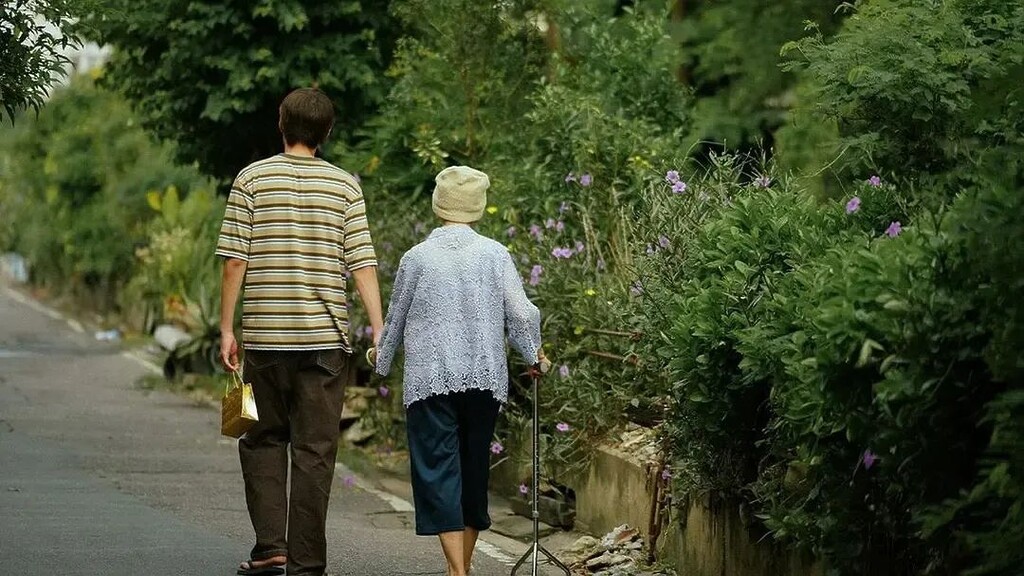 It’s remarkable how profoundly a movie can resonate. with people . The intricate details of the story felt like vines that had grown with me, winding through my childhood. Perhaps the bond of family carries an indescribable tension and connection. The protagonist, a grandson, lives with his mother in a modest house amidst Southeast Asia’s humid rainy season and lush banana leaves, working as a livestreamer with only four viewers. How do today’s young people find an “easy, high-paying job”? When he notices his cousin earning a substantial inheritance by caring for their gravely ill grandfather, he sets his sights on his terminally ill grandmother, aiming to replicate her fortune-building path.
It’s remarkable how profoundly a movie can resonate. with people . The intricate details of the story felt like vines that had grown with me, winding through my childhood. Perhaps the bond of family carries an indescribable tension and connection. The protagonist, a grandson, lives with his mother in a modest house amidst Southeast Asia’s humid rainy season and lush banana leaves, working as a livestreamer with only four viewers. How do today’s young people find an “easy, high-paying job”? When he notices his cousin earning a substantial inheritance by caring for their gravely ill grandfather, he sets his sights on his terminally ill grandmother, aiming to replicate her fortune-building path.
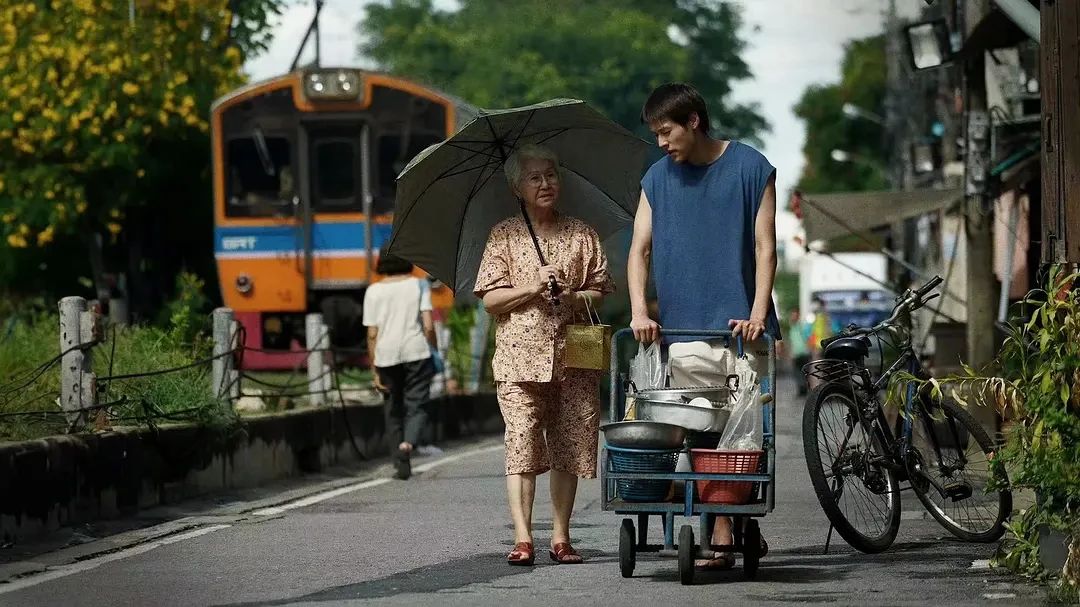 As a film painted with familial affection, it explores family dynamics and highlights the struggles of East Asian women. The creators skillfully incorporated topics relevant to today’s youth, such as job-seeking challenges, pivoting to the “silver economy,” and the quest for meaning.
As a film painted with familial affection, it explores family dynamics and highlights the struggles of East Asian women. The creators skillfully incorporated topics relevant to today’s youth, such as job-seeking challenges, pivoting to the “silver economy,” and the quest for meaning.
The contrast between the cousin and the grandson stands out. The grandson’s desires are clear—he’s after the million-dollar inheritance. He dedicates his time to buying fried fish for his grandmother, waking up at 6 AM to sell porridge, and eventually developing genuine feelings for her. The cousin, on the other hand, despite her newfound wealth and independence, still struggles to find her passion, purpose, or a sense of belonging. She eventually opts to provide end-of-life care for another family member. Society’s hierarchical structure provides ambition as a motivator, but emptiness often lingers—a bottomless abyss when one forgets the reasons for joy, sorrow, existence, and survival. What then distinguishes carbon-based beings from silicon-based ones?
As the grandson moves in with his grandmother, their intergenerational relationship, bound by blood yet strained in communication, unfolds under the same roof. If festive family gatherings feel like long-awaited reunions, then day-to-day companionship reveals both the nourishing rice fields and the uninvited weeds.
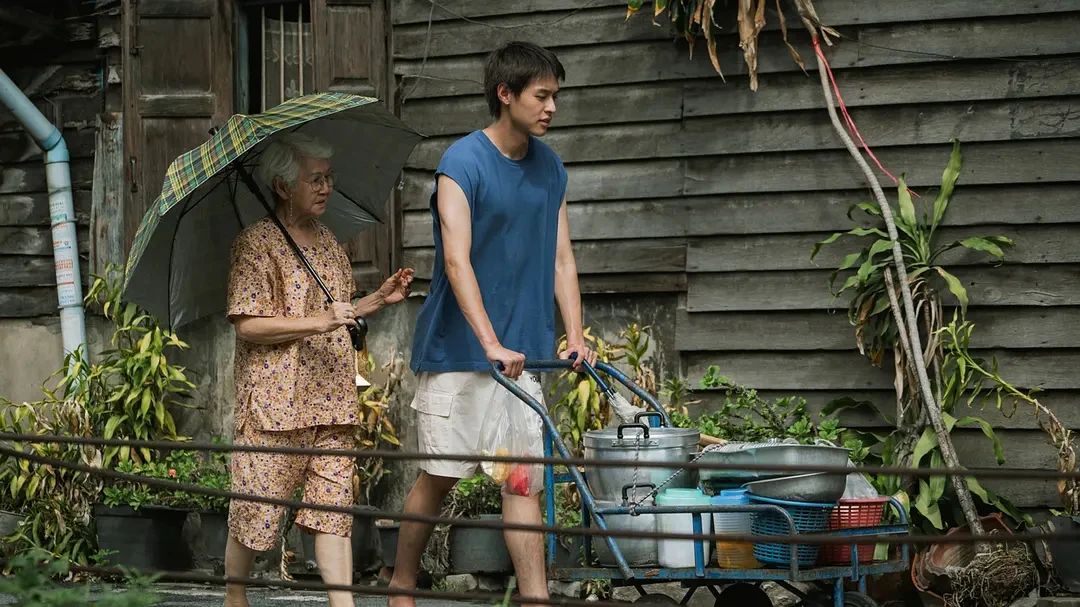 To the grandson, this journey started as a pursuit of “solving the problem” for the pot of gold—the million-dollar inheritance. Yet, as he spends time with his grandmother, the lazy, drifting boy is softened by tender moments. In the latter half of the film, as her condition worsens, the grandmother often wakes in unbearable pain, murmuring in her dreams, “Mom, Dad, take me away. It hurts so much.” In the end, the grandson sings her a Chaozhou lullaby in her native dialect, bidding farewell in the way she was first welcomed into the world. It completes the circle of life. The grandson came for profit and left with love. His lesson wasn’t about good or evil—because there is no absolute good or evil.
To the grandson, this journey started as a pursuit of “solving the problem” for the pot of gold—the million-dollar inheritance. Yet, as he spends time with his grandmother, the lazy, drifting boy is softened by tender moments. In the latter half of the film, as her condition worsens, the grandmother often wakes in unbearable pain, murmuring in her dreams, “Mom, Dad, take me away. It hurts so much.” In the end, the grandson sings her a Chaozhou lullaby in her native dialect, bidding farewell in the way she was first welcomed into the world. It completes the circle of life. The grandson came for profit and left with love. His lesson wasn’t about good or evil—because there is no absolute good or evil.
For the grandmother, the story unearths long-neglected memories, like seaweed clinging to sunken reefs, slowly emerging as the grandson arrives.
The grandmother has three children. Her eldest son, part of the elite, leads a comfortable life. Yet, their definitions of “family” differ. One day, while visiting a temple, the grandmother writes on her prayer card: “May I recover soon; may my eldest son, daughter, and youngest son be healthy and prosperous; and may my grandson find a good job.” Meanwhile, the eldest son writes, “May my wife and daughter be happy.”
Grandson: “No one prayed for you.”
Grandmother: “He has a family. He must prioritize them.”
Grandson: “Grandma, aren’t you his family?”
 The youngest son, idle and a gambler, doesn’t show up when the grandmother is hospitalized. His presence in the film is limited to incidents like the theft of her retirement savings and the installation of a wobbly handrail in her bathroom.
The youngest son, idle and a gambler, doesn’t show up when the grandmother is hospitalized. His presence in the film is limited to incidents like the theft of her retirement savings and the installation of a wobbly handrail in her bathroom.
Grandmother: “If he doesn’t come, it means he’s doing well.”
 The daughter, the grandson’s mother, dropped out of school as a child to help her mother sell porridge. She now works a modest supermarket job and switches to the night shift to take her mother to chemotherapy during the day.
The daughter, the grandson’s mother, dropped out of school as a child to help her mother sell porridge. She now works a modest supermarket job and switches to the night shift to take her mother to chemotherapy during the day.
Son: “What are you hoping for?”
Mother: “She’s my mom. Isn’t it my duty to take care of her?”
 As the story unfolds, who do you think the grandmother will leave her inheritance to?
As the story unfolds, who do you think the grandmother will leave her inheritance to?
Daughter: “The son gets the inheritance; the daughter gets the cancer.”
This result might seem unfair, yet no one can deny its logic. Why? Because the grandmother’s parents did the same—she cared for them until their last moments, but the inheritance went to her brother. This isn’t about right or wrong; it’s about a deeply rooted generational pattern. The tendrils of blood ties run deep, connecting to every nerve ending. The grandmother’s lesson, too, lacks definitive right or wrong.
 The story is done, let’s revisit the film’s title. The English version, How to Make Millions Before Grandma Dies, is provocative and eye-catching, akin to a tabloid headline. Grandma’s Grandson, on the other hand, might seem understated, focusing on the generational relationship. Yet, after watching the film, its promotional slogan—“Thailand’s box office champion, highly acclaimed”—resonates. The title avoids sensationalism, drawing viewers back to the essence of familial bonds.
The story is done, let’s revisit the film’s title. The English version, How to Make Millions Before Grandma Dies, is provocative and eye-catching, akin to a tabloid headline. Grandma’s Grandson, on the other hand, might seem understated, focusing on the generational relationship. Yet, after watching the film, its promotional slogan—“Thailand’s box office champion, highly acclaimed”—resonates. The title avoids sensationalism, drawing viewers back to the essence of familial bonds.
From my own memory, my impression of my grandmother is that of a kind and loving elder. Though we didn’t spend much time together, whenever we did, she devoted her energy to her grandchildren. My mother seemed to have a love-hate relationship with her—sometimes frustrated by her favoritism toward her sons, yet it never diminished her love for her.
Getting along with family is indeed a required course. We are tied by blood, yet separated by generational gaps or physical distance. It’s often, “Don’t I know you well enough?” or “Forget it, you wouldn’t understand anyway.” Family members, being the closest to us, often bear the brunt of our emotions. They share in our joys and feel even deeper pain for our sorrows. Learning to get along with family helps us learn how to connect with others, like mastering one sport or instrument—it opens the door to mastering others.
2024 has passed. Last year, I picked up a musical instrument again, learned new sports, and traveled to different countries and cities with my mom. Both family and the wider world matter to me. I’m still learning how to better connect with her. I cut my hair at the start of the year, hoping for a fresh start. Let’s move forward together into a brighter future.


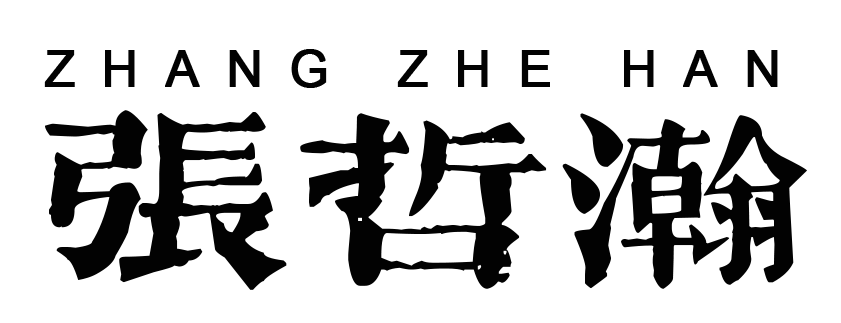
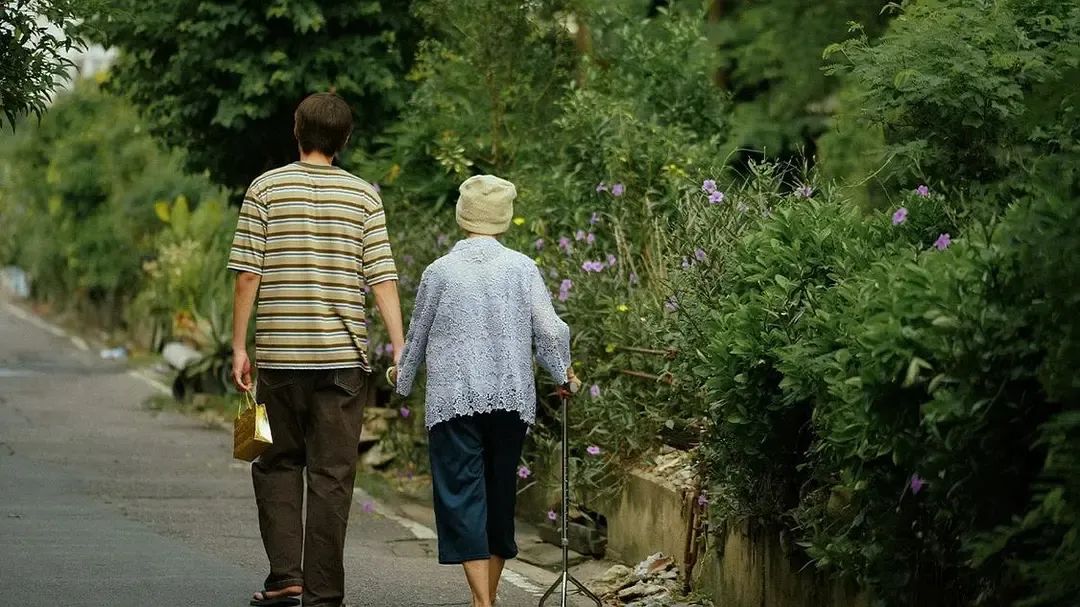


The generational relationship is similar across Asian culture. We are all bound by blood relationships. “Blood is stickier than water” as the saying goes. But, due to western influences, the dynamics of family relations are changing.
翻译 Translate
I watched this movie recently. It was deeply moving. A beautiful, tender story that brought me to tears and made me smile.
It was particularly heartwarming to watch M’s growth as he developed compassion and matured.
翻译 Translate
I mean I miss your article ❤️❤️
翻译 Translate
I miss you .
翻译 Translate
Waiting for another movie recommendation
翻译 Translate
I miss Sanmi gege
翻译 Translate
Always such depth, wisdom and beauty to your writing.
I am left with so much to contemplate and so many thoughts to reassess whenever I finish reading your work.
Thank you💙
翻译 Translate
Is leaving money behind the elderly the only way they can be happy? Money and love are not equal.
翻译 Translate
队长你平时看起来太不懂事了。 书和电影的话题太稳重太沉重了,看起来想法真的很深,我也和队长一起,今年是新成功的开始。 希望可以~
翻译 Translate
I finally ready to watch it, but then I saw gyeongsong creature 2 and I remember I haven’t watched it
Yeah my coward self is choosing kdrama first 😂😂😂
翻译 Translate
其实,到三坚这里学英文蛮好的😂
翻译 Translate
An English version! How sweet the IT team is!
翻译 Translate
어려운 영화인데!!!! 한국에선 볼 수 없을것 같아요!!!
翻译 Translate
Thank you for providing English translation
I’m still not ready to watch the movie 🤣
翻译 Translate
Looking forward to moving into a brighter future alongside you, Director Zhang 🥰
翻译 Translate
I love your ability to see nuance (I cannot see nuance, I am incredibly black and white), and I love your ability to accurately put yourself in the place of another and understand them… it is the actor in you, of course 🥰 and also, it is the empathetic and gentle soul we love so much 💙
翻译 Translate
I love this line: ‘What then distinguishes carbon-based beings from silicon-based ones?’ So incredibly thought-provoking in this day and age…
翻译 Translate
I am incredibly proud of your success and look forward to seeing what the future holds for you. Love you ❤️
翻译 Translate
Thanks for sharing Captain Zhe. You are capable of achieving greatness. Believe in yourself and keep moving forward.
翻译 Translate
Let’s move forward together into a brighter future.
翻译 Translate